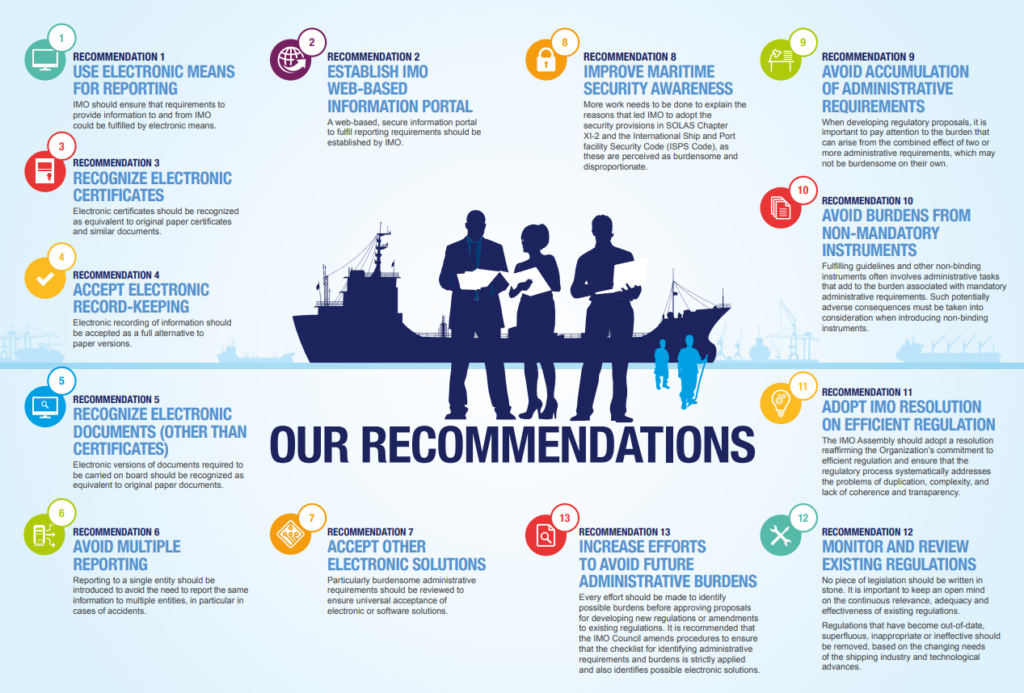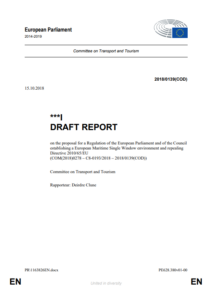Improving the regulatory landscape is an important step for the maritime industry to raise operational efficiency, thus, reducing unnecessary administrative burdens is identified as appropriate. In this light, IMO, along with other organizations as well, are taking actions to reduce the so called ‘red tape’ in the sector and its implications.
IMO conventions and other instruments aim to keep up with the current needs of the shipping industry, by using the latest technological advances, and other improved systems to make regulatory compliance easier.
[smlsubform prepend=”GET THE SAFETY4SEA IN YOUR INBOX!” showname=false emailtxt=”” emailholder=”Enter your email address” showsubmit=true submittxt=”Submit” jsthanks=false thankyou=”Thank you for subscribing to our mailing list”]
However, IMO is only a part of the equation, as the sector as a whole and maritime stakeholders are an integral part of the solution. Therefore, their cooperation is considered vital to limit administrative burdens and reach a smarter and more efficient regulation.
For this reason, the 27th Assembly in November 2011 adopted a process to periodically review administrative need in mandatory instruments and confirmed that:
Releasing resources from administrative tasks for Administrations and industry alike, contributes to the Organization’s goals of efficient regulation of safety and security of shipping and the prevention and control of pollution by ships
‘Have your say’
In order to better understand the sector’s thinking for this aspect, IMO carried out an online consultation called ‘Have Your Say.’ The consultation took place from May to October 2013, were ship masters, senior officers and ships’ crews participated.
The experiences of ships’ crews were of a particular interest. As IMO noted:
The vast amount of administrative requirements, seen as a whole, together represents a huge administrative burden for the company and crew on board
A major finding was that 66% of the administrative requirements that the consultation touched upon, – 351 out of the total of 563 – were not considered as being a burden by any of the respondents. In fact, one respondent stated that the administrative burdens resulting from IMO instruments were “the very minimum” by comparison.
Despite the fact that some administrative requirements can be justified, their volume leads to a number of bureaucratic tasks. This keeps the crew from actually manning and operating the ship, something that could set safety at risk.
In the same wavelength, in an interview with SAFETY4SEA, Mr. Andreas Nicolaou, Managing Director at Dromon Bureau of Shipping, argued that the road to a robust safety culture in the maritime industry is not to add new standards, but to ensure the effective implementation of the existing standards.
In this respect, Mr. Nicolaou added that the industry is characterized by an administrative burden that tends to discourage seafarers from their prime duties.
Moreover, the survey respondents believe that inspectors focus extensively on ensuring compliance with the correct procedures and establishing that the necessary. This practice essentially evaluates the quality of the oversight system, and does not sheds light on the quality of the ship and the crew.
Now, a more careful analysis of each of the 182 administrative requirements (out of the total of 563) that were perceived as burdensome, indicates that many respondents identify that problems with excessive paperwork are related to regulatory compliance. There are many comments calling for ‘urgent change’, which could be achieved through working with “smart” databases on websites which have secure access. This practice would be able to rationalise the compliance with administrative requirements.
This is indicative of a new, IT-savvy generation seriously questioning the necessity of keeping multiple records covering the same event or subject matter, and asking why inspectors seemingly spend more time poring over a ship’s certificates than physically looking over the ship
IMO explained.
Reducing administrative burdens
To mitigate these burdens, it was suggested that certificates should be posted on a website with access provided to accredited authorities. This would be a type of ‘ships Facebook’, as one respondent put it.
In addition, the consultation concluded that there is a problematic culture with bureaucracy which needs to change. Specifically, the tendency to ‘smother everything we do with paper’ is indicative of a blame orientated and litigious culture. This encourages the increase of paperwork in order to prove compliance with relevant procedures.
Debating on these administrative burdens, the Ad Hoc Steering Group for Reducing Administrative Requirements (SG-RAR), established by the Council at its 108th session in 2012, evaluated the responses and developed recommendations on how to limit administrative burdens. The recommendations are presented below:
Recommendations
- Use electronic means for reporting: IMO should ensure that requirements to provide information to and from IMO could be fulfilled by electronic means.
- Establish IMO web-based information portal: A web-based, secure information portal to fulfil reporting requirements should be established by IMO.
- Recognize electronic certificates: Electronic certificates should be recognized as equivalent to original paper certificates and similar documents.
- Accept electronic record-keeping: Electronic recording of information should be accepted as a full alternative to paper versions.
- Recognize electronic documents (other than certificates): Electronic versions of documents required to be carried on board should be recognized as equivalent to original paper documents.
- Avoid multiple reporting: Reporting to a single entity should be introduced to avoid the need to report the same information to multiple entities, in particular in cases of accidents.
- Accept other electronic solutions: Particularly burdensome administrative requirements should be reviewed to ensure universal acceptance of electronic or software solutions.
- Improve maritime security awareness: More work needs to be done to explain the reasons that led IMO to adopt the security provisions in SOLAS Chapter XI-2 and the International Ship and Port facility Security Code (ISPS Code), as these are perceived as burdensome and disproportionate.
- Avoid accumulation of administrative requirements: When developing regulatory proposals, it is important to pay attention to the burden that can arise from the combined effect of two or more administrative requirements, which may not be burdensome on their own.
- Avoid burdens from non-mandatory instruments: Fulfilling guidelines and other non-binding instruments often involves administrative tasks that add to the burden associated with mandatory administrative requirements. Such potentially adverse consequences must be taken into consideration when introducing non-binding instruments.
- Adopt IMO resolution on efficient regulation: The IMO Assembly should adopt a resolution reaffirming the Organization’s commitment to efficient regulation and ensure that the regulatory process systematically addresses the problems of duplication, complexity, and lack of coherence and transparency.
- Monitor and review existing regulations: No piece of legislation should be written in stone. It is important to keep an open mind on the continuous relevance, adequacy and effectiveness of existing regulations. Regulations that have become out-of-date, superfluous, inappropriate or ineffective should be removed, based on the changing needs of the shipping industry and technological advances.
- Increase efforts to avoid future administrative burdens: Every effort should be made to identify possible burdens before approving proposals for developing new regulations or amendments to existing regulations. It is recommended that the IMO Council amends procedures to ensure that the checklist for identifying administrative requirements and burdens is strictly applied and also identifies possible electronic solutions.

More organizations reduce bureaucracy
As IMO is the legislator for the shipping industry, the focus is mainly on is actions. However, other organizations have taken measures to alleviate the industry of unnecessary red tape as well.
European Maritime Single Window
On 8 February 2019 an agreement was reached between the European Council, the European Commission and the European Parliament, regarding the proposal to harmonize ship notifications in Europe, through the European Maritime Single Window.
Namely, a draft report published on 15 October 2018, by the European Parliament’s Committee on Transport and Tourism sets out a proposal for a Regulation creating a European Maritime Single Window environment.
The report focuses on the harmonisation of data elements and data sets, and supports the cooperation between customs and maritime authorities at both national and Union level. It also recognises that, even with a fully harmonised data set, relevant authorities might require additional data.
Moreover, the draft report states that Member states should allow the use of port community systems, as long as those systems are then passing the necessary information to the National Single Window.
What is more, the report underlines the importance to provide National Single Windows with a governance dimension and takes a realistic approach concerning the reporting only once principle.
Denmark reduces administrative burdens with blockchain
The Danish Ministry of Industry, Business and Financial Affairs announced a project on May 2018, in which it will use blockchain technology, in order to significantly reduce administrative burdens in the maritime sector.
The project includes the ship trade and ship registration processes which often cross borders and time zones, making them complicated and time-consuming. In some cases, travelling halfway around the world to sign a legal contract to finalize a deal may even be required. With blockchain solutions such travels can be avoided, saving ship owners both time and money.
Excessive paperwork is definitely a problem. While individual regulations may not seem burdensome, their accumulation puts increased pressure on the crew, which sometimes keeps them from focusing on ensuring the ship’s safety. Increased digitalization seems to provide a solution, with electronic documents, but a better cooperation between every actor in the sector is necessary.










































![]](https://safety4sea.com/wp-content/uploads/2024/06/shutterstock_2318996555-350x250.jpg)
























